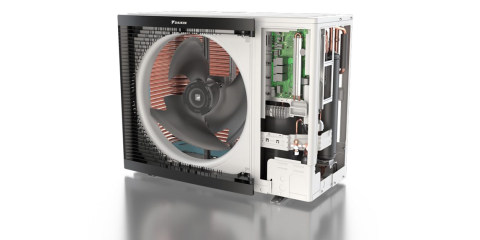Heatrex - Higher value retention of heat pumps by using fewer materials

The demand for sustainable energy solutions is increasing, and heat pumps play a key role in this. But how can we reduce the ecological footprint of these technologies and extend their lifespan? The HEATReX project in which Flanders Make is participating seeks answers by applying circular strategies, such as repair, reuse and overhaul. This project focuses on preserving value within the ecosystem of residential heat pumps and aims to develop a blueprint for a more sustainable use of materials, which can also be applied in other industries.
No climate transition without materials transition
To achieve its green heat targets, the Flemish Energy and Climate Plan (VEKP) envisages the installation of 231,000 residential heat pumps by 2030 (or 50,000 per year). This will significantly reduce Flanders' annual carbon footprint. As desirable as they are for the energy transition, solutions such as heat pumps (but also electric cars, batteries, wind turbines, photovoltaic panels) have a non-negligible carbon footprint due to their material use, stored energy and emissions during the production phase. Moreover, some critical raw materials for heat pumps are becoming more expensive and scarce. Supply chains are also increasingly vulnerable to disruptive events. It should be clear: reducing the material use of heat pumps is crucial.
The HEATReX project aims to investigate and put into practice how mechatronic products can retain their value longer by applying circular ReX strategies. ReX then stands for reuse, repair, refurbishment, reconditioning or remanufacturing. The project seeks viable ReX concepts and addresses bottlenecks for residential heat pumps. As these are distributed via indirect distribution (sales and services via a dealer network), it is important to involve the entire ecosystem. The knowledge and solutions will be built within the specific ecosystem around residential heat pumps, but project results and lessons learned will also be shared with a broader target group in the manufacturing industry.
The challenge
Within the ecosystem around heat pumps, there is currently a lack of insights on ReX strategies -both at the level of individual components, and of the heat pump itself- and their impact on the value chain.
Consequently, these life extension strategies are hardly applied. Challenges include the current preference for complete pump replacement over repair, problems with component return, assessment and overhaul, and the lack of a balanced business model and marketplace in existing value chains.
The goal: greatly reduced footprint per kilowatt of heat installed
In the HEATReX project, we investigate which circular ReX strategies are feasible and affordable. These strategies should also result in a significantly reduced footprint per installed kilowatt of heat. We are exploring different scenarios, testing combinations of circular strategies, business models and forms of cooperation. We also experiment with operational concepts and supporting (digital) technologies. Finally, we gather insights on how the design of heat pumps, their components and the configuration of the ecosystem can increase feasibility.
We will also apply the insights gained to similar sectors. In the long term, we aim to both accelerate the transition to green heat and significantly reduce the material footprint of mechatronic systems installed and maintained through dealers.
Also read our project partner Sirris' article on the HEATReX-project.
How can your company participate?
Want to get started on this theme with your company? Then contact us for valuable insights and cooperation partners who can help you further. We focus on specific Flemish sectors with this project:
- Companies in the manufacturing industry that produce, sell and maintain high-quality mechatronic products through dealers. Think of companies such as Daikin and Climatronix, active in building technology, but also in sectors such as e-mobility, energy supply and manufacturing.
- Service and customisation companies already offering or considering ReX services (reuse, repair, overhaul).
- Technology providers looking to expand or adapt their solutions to support the circular economy, such as condition assessment tools, digital product passports or digital marketplaces.
Funding
This project is funded by the Circular Economy Living Lab from the Flemish agency Innoveren & Ondernemen. Flanders wants to drastically reduce its materials footprint and greenhouse emissions by 2030 and is fully committed to an accelerated transition to the circular economy. Through the Living Labs, the Flemish government supports circular projects in the manufacturing industry, around, for example, less consumption of raw materials, reuse of materials and repurposing of parts.
Partners




